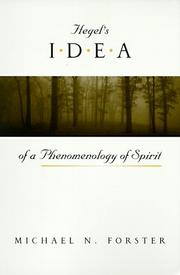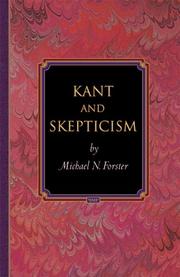| Listing 1 - 5 of 5 |
Sort by
|

ISBN: 0226257428 0226257401 9780226257402 Year: 1998 Publisher: Chicago: University of Chicago press,
Abstract | Keywords | Export | Availability | Bookmark
 Loading...
Loading...Choose an application
- Reference Manager
- EndNote
- RefWorks (Direct export to RefWorks)

ISBN: 9780691129877 0691129878 Year: 2008 Volume: *3 Publisher: Princeton: Princeton university press,
Abstract | Keywords | Export | Availability | Bookmark
 Loading...
Loading...Choose an application
- Reference Manager
- EndNote
- RefWorks (Direct export to RefWorks)
Kant, Immanuel --- Skepticism. --- Kant, Immanuel, --- Skepticism --- Scepticism --- Unbelief --- Agnosticism --- Belief and doubt --- Free thought --- Kant, Emmanuel --- Kant, Emanuel --- Kant, Emanuele --- Kant, I. --- Kānt, ʻAmmānūʼīl, --- Kant, Immanouel, --- Kant, Immanuil, --- Kʻantʻŭ, --- Kant, --- Kant, Emmanuel, --- Ḳanṭ, ʻImanuʼel, --- Kant, E., --- Kant, Emanuel, --- Cantơ, I., --- Kant, Emanuele, --- Kant, Im. --- קאנט --- קאנט, א. --- קאנט, עמנואל --- קאנט, עמנואל, --- קאנט, ע. --- קנט --- קנט, עמנואל --- קנט, עמנואל, --- كانت ، ايمانوئل --- كنت، إمانويل، --- カントイマニユエル, --- Kangde, --- 康德, --- Kanṭ, Īmānwīl, --- كانط، إيمانويل --- Kant, Manuel,
Book
ISBN: 0674387074 Year: 1989 Publisher: London Cambridge, Mass Harvard University Press
Abstract | Keywords | Export | Availability | Bookmark
 Loading...
Loading...Choose an application
- Reference Manager
- EndNote
- RefWorks (Direct export to RefWorks)
Hegel, Georg Wilhelm Friedrich --- Views on skepticism --- Skepticism --- History --- 19th century
Book
ISBN: 9780199228119 0199228116 0199659389 9786612939396 0191582794 1282939394 9780191582790 9781282939394 6612939397 Year: 2010 Publisher: Oxford [etc.] Oxford University Press
Abstract | Keywords | Export | Availability | Bookmark
 Loading...
Loading...Choose an application
- Reference Manager
- EndNote
- RefWorks (Direct export to RefWorks)
Michael Forster explores the tradition of the study of language in German philosophy. He also makes the case that the most important thinker within that tradition was J.G. Herder.
Language and languages --- Philosophy. --- Herder, Johann Gottfried, --- Philosophy --- Herder, J. G. --- Gerder, Iogann Gotfrid, --- Herder, Johann Gottfried von, --- Herder, Yohan Goṭfrid, --- Herder, J. G. von --- Von Herder, J. G. --- Herder, Giovanni Goffredo, --- הערדער, יאהן גאטטפריעד פ. --- הרדר, יוהאן גוטפריד, --- von Herder, Johann Gottfried --- Herder, Johann Gottfried
Book
ISBN: 9780199696543 9780191756917 0199696543 Year: 2015 Volume: *25 Publisher: Oxford [etc.] Oxford University Press
Abstract | Keywords | Export | Availability | Bookmark
 Loading...
Loading...Choose an application
- Reference Manager
- EndNote
- RefWorks (Direct export to RefWorks)
No period of history has been richer in philosophical discoveries than Germany during the eighteenth and nineteenth centuries. And while it was the eighteenth century that saw Germany attain maturity in the discipline (above all in the works of Immanuel Kant), it was arguably the nineteenth century that bore the greatest philosophical fruits. This Handbook provides a comprehensive introduction to the philosophy of nineteenth-century Germany that will be helpful to readers of very different sorts, all the way from laymen to undergraduates to experts. The volume is divided into four parts. The first Part explores individual philosophers, including Fichte, Hegel, Kierkegaard, and Nietzsche, amongst other great thinkers of the period. The second addresses key philosophical movements: Idealism, Romanticism, Neo-Kantianism, and Existentialism. The essays in the third Part engage with different areas of philosophy that received particular attention at this time, including philosophy of nature and of science, philosophy of mind and language, the philosophy of education, and the relationship between philosophy and science, or Wissenschaft (a German term that is famously less narrowly restricted to natural science and disciplines modeled on it than its English counterpart). Finally, the contributors turn to discuss central philosophical topics, from skepticism to materialism, from dialectics to ideas of historical and cultural Otherness, and from the reception of antiquity to atheism.
History of philosophy --- anno 1800-1899 --- Germany --- Philosophie --- Néokantisme --- Marx, Karl, --- Allemagne --- Histoire --- Philosophy, German --- E-books --- Filosofi --- Filosofie. --- Philosoph. --- Philosophie. --- Philosophy, German. --- Historia. --- 1800-1899. --- 1800-talet. --- Deutschland. --- Duitsland. --- Tyskland. --- Néokantisme. --- Marx, Karl
| Listing 1 - 5 of 5 |
Sort by
|

 Search
Search Feedback
Feedback About UniCat
About UniCat  Help
Help News
News